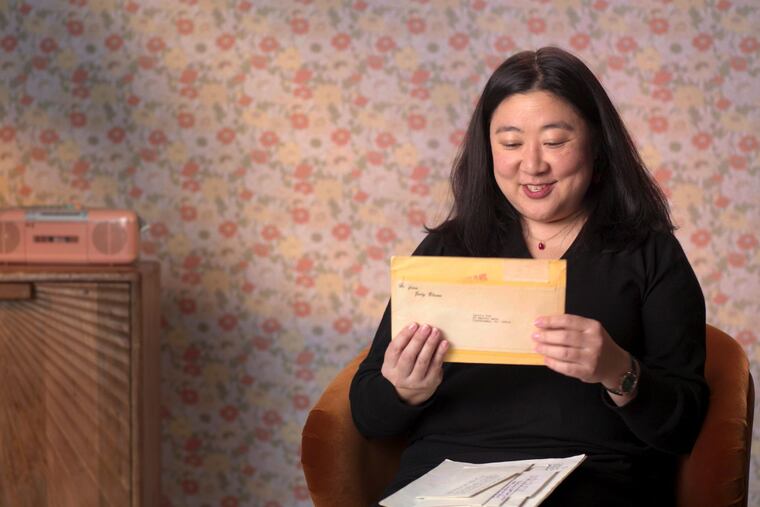The Bryn Mawr grad who took Judy Blume to her graduation
Lorrie Kim appears in the new documentary on the author of “Are You There God? It’s Me Margaret.”

“The current wave of book banning is bizarre and disgusting,” author Lorrie Kim says to The Inquirer over the phone.
Back in 1984, when Kim was 16, her pen pal, author Judy Blume, wrote to her about the National Coalition Against Censorship in a letter and mentioned “being really busy with work with that organization.” By that time, it had been seven years since Kim first wrote to Blume.
Growing up in central New Jersey, and in the fourth grade, Kim admittedly “had no idea what menstruation or sex or anything like that was.” Which was when some of her classmates “shook their heads” and “kindly led” Kim over to the section of the school library where Judy Blume’s books were stacked. Kim picked up Blume’s 1970 novel, Are You There God? It’s Me, Margaret.
“I remember feeling really angry,” Kim said, “that I hadn’t been told all these important things [about myself] … that there was this adult conspiracy to keep me ignorant even though everyone else already knew.”
That’s when she decided to write Blume a letter.
“I just wrote down everything that I wanted to ask her. No one had taught me that you couldn’t write to an author … so I was sending a letter out into the void,” she said. Blume wrote back, and the two haven’t stopped writing to one another ever since. It has been 45 years since that first letter from Blume, that came with a brochure Blume had written for a sanitary napkin company. It was called Growing Up and Liking It.
Kim and her letters appear with Blume in the new documentary Judy Blume Forever, directed by Leah Wolchok and Davina Pardo. It plays at the PFS SpringFest on Saturday and releases April 21 on Amazon Prime.
“Between the time that we filmed and now, the political climate around book banning has gotten so much worse,” said Kim, who lives in West Philly with her spouse and two teenage “offsprings.” “We need to know that we have fought this battle before, and we don’t always lose,” she said, referring to the many times Blume’s books have been banned in the past. “I sell banned books” read the stickers that adorn the walls and shelves of Blume’s Books and Books bookstore in Key West, Fla.
Back when Kim graduated from Bryn Mawr, in the 1980s, book banning was epidemic. That was also when Kim’s family faced some problems flying into the States from Korea, in time for Kim’s graduation. Not wanting to be “the only person at my college graduation without family members,” Kim wrote to Blume asking if she and her husband, lawyer George Cooper, would attend as her family. “She said, ‘Yes,’ and she was very firm about it,” Kim recalled.
With Bryn Mawr being a historically all-women’s college, Blume’s books had been fodder for almost every student’s intellectual growth. Kim remembered feeling very happy when she introduced her proxy family to her professors — not just Blume, who is “such an important part of American literature,” but the couple for their political activism against censorship.
Yet, it’s not just Blume’s activism that inspires Kim — she identifies as a “Harry Potter Fan for Trans Rights,” “A part of what I know about parenting, I absorbed from her,” she said. “Things about not being ashamed, things about being open, about respecting the opinions of children from the moment they’re born.”
Long before Kim wrote Snape: The Definitive Analysis of Hogwarts’s Mysterious Potions Master in 2022, she was a journalist who wrote extensively for the Philadelphia Gay News. From 1998 to 2003, she maintained Rainbow Ice, the first website devoted to LGBTQ issues in figure skating. Did Blume inspire her to write? “It’s hard to know, because starting from age 9, she was always in my life. But I’m sure the answer is yes,” Kim said.
In her letters to Kim, Blume would often write of her life as an author — how when she lived in New Mexico, Blume had to move her desk away from the window because the scenery was distractingly beautiful. Then when she would have to do publicity for a new book, she often found it frustrating because all she wanted to do was to write her next book. And she couldn’t, for months. “It was just these everyday details about being a writer that made me think this is a life, too,” Kim said.
While the documentary comes at a time of intense moralistic gatekeeping, Blume, Kim said, is the opposite of a gatekeeper. “She insists that anyone can be a writer, that anyone’s own voice and authority is important and worth listening to. And nothing is more authoritative than what someone says about their own life.”
Even in these “bizarre and disgusting” times, as Kim calls it, she (like Blume) is ready for battle. Blume, she said, is still here to remind us, this war has been won before. “It might be frightening, but it’s worth fighting.”
“Judy Blume Forever” screens at the PFS SpringFest, April 15, 4 p.m., Philadelphia Film Center, 412 Chestnut St., Phila., filmadelphia.org/springfest. It releases April 21 on Amazon Prime.